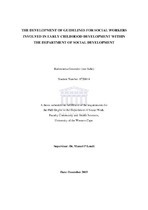| dc.description.abstract | Social workers employed by the Department of Social Development in South Africa are tasked with the provision of a broad spectrum of social services and may specialise in fields, such as welfare planning, which involves the capacity building, support and monitoring of welfare organisations. Early childhood development services fall in this category, as these services are monitored by social workers. Social workers employed by the Department of Social Development are the only group tasked with the mandate to capacitate, register partial care facilities and programmes, as well as monitor unregistered and registered facilities, on an on-going basis. Social workers adhere to these mandates amid many challenges. The aim of this study is to develop guidelines for social workers, who render services to Early Childhood Development (partial care) facilities. The objectives of this study are to explore the needs of social workers in the Early Childhood Development field in the Department of Social Development, identify challenges related to effective service delivery, explore the current methods of service delivery, develop guidelines and refined the draft guidelines, through a Delphi study. The Intervention Research design was used in this study, as it best suited the development of a tool; however, it was adapted to use only certain phases that were suitable for implementation for this study. The adaptation involved the use of the first four phases of the Intervention research method, combining of phase 1 and 2 to form a new phase 1 of the modified phases that linked to objectives one and two of the study. Therefore, this study only has three operational phases. A qualitative methodology was employed in this study to achieve the intended outcomes. Data collection occurred through semi-structured and telephonic interviews. Purposive sampling was used to select twenty (20) social workers from the Department of Social Development in the Western Cape and five (5) in the Eastern Cape. These participants engaged with Early Childhood Development facilities and interviews were conducted with them, while five (5) telephonic interviews were conducted with social workers in the Eastern Province. Conclusions from the analysed data were used to develop guidelines for DSD social workers within ECD settings. Two rounds of a Delphi study were employed to refine the proposed guidelines. | en_US |

